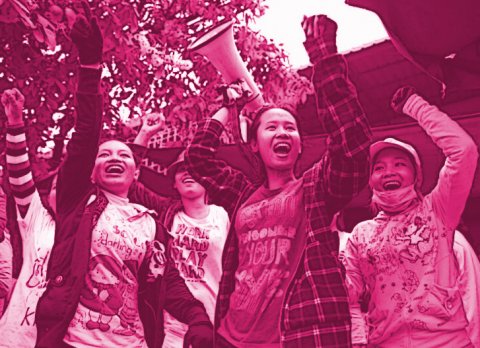Women's Rights

Gender-based discrimination is an endemic problem in maquila factories throughout Central America and in garment export factories around the world.
Women workers face discrimination in hiring, promotions, and dismissals; sexual harassment and other forms of violence in the workplace; and lack of respect for their rights to health care, maternity and childcare benefits.
MSN collaborates with women’s and trade union organizations to ensure that employers and governments live up to their responsibilities to respect workers’ rights, concentrating on the issues that have the greatest negative impacts on women workers.
With a focus on Central America, MSN engages with international apparel brands and manufacturers through the Americas Group on the steps they should take to address four priority issues – lack of legally-mandated child care benefits, health and safety issues facing women workers, sexual harassment and other forms of violence in the workplace, and failure to provide social security benefits and severance pay.
Right to Child Care
Most women workers have a double day – working for wages in the formal economy and working at home caring for their children, as well as other family members. The value to society and the economy of their unpaid labour in the home -- raising the next generation of workers -- is generally unrecognized.
MSN collaborates with women’s and trade union organizations while engaging with international apparel brands, industry associations and governments to find childcare solutions that best meet the needs of women maquila workers.
Health and Safety
Women and men working in the maquilas face a number of health and safety hazards, including production practices, such as high production targets and long work shifts, that can result in muscular-skeletal injuries. Those who suffer debilitating injuries caused by these practices are often unable to continue working in the maquilas and are forced back into the informal economy.
Workplace Violence Against Women
Sexual harassment by supervisors and other management personnel, as well as security guards, is an all-too-common experience faced by women maquila workers. In addition, both female and male workers often experience other forms of violence in the workplace, including verbal and physical abuse, as well as threats of abuse by supervisors to coerce workers to meet production quotas. Workers attempting to organize unions have also faced violence and threats of violence.
Failure to Provide Social Security and Severance Benefits
Employers in the maquila sector often fail to register workers for social security, fail to keep up to date with their social security contributions, and/or fail to provide workers their full legally required severance pay in the event of a factory closure. As a result, workers and their dependents are denied their legally-mandated health care and maternity benefits and are left without income or health care services when their factory closes.
